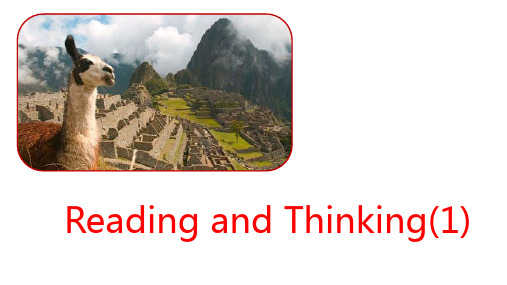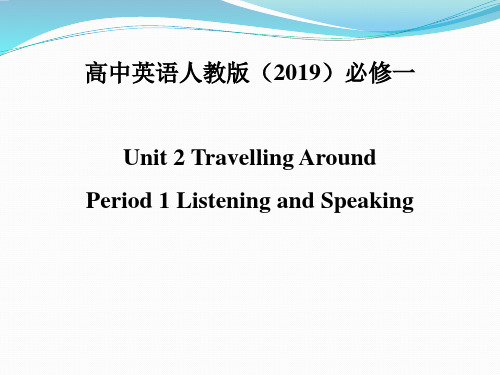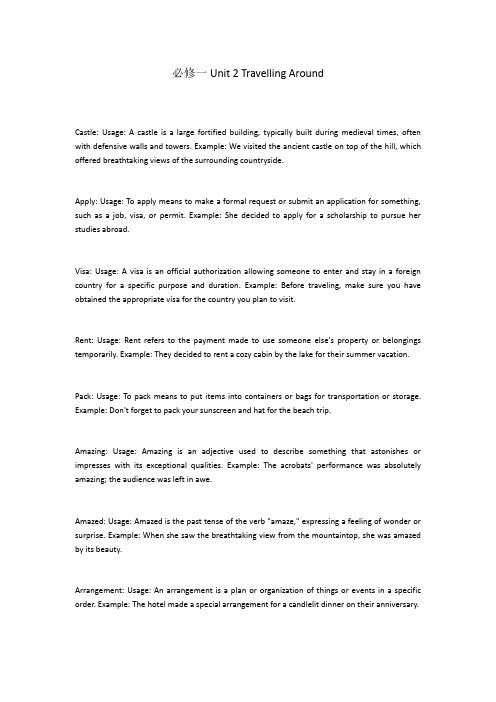人教版高中英语必修第一册《Unit 2 Travelling around》说课稿
Unit 2 Travelling Around课件-高中英语人教版(2019)必修第一册

Let’s review
Get a passport Apply for a visa Buy a guidebook Book a ticket Pack some clothes
Book a hotel room Research the local weather
3. What are some other sources of information can you find about Peru, apart from videos?
special or unusual
plants and animals unique to the rainforest = unique plants and animals in the rainforest
Accommodation
the middle of the forest
Activity
Reading and Thinking(1)
Which country would you like to visit ?
the London Eye
he Leaning Tower of Pisa
Big Ben the London Bridge
Disneyland
Sydney Opera House
Pre-reading
Know more about Peru
to travel to or around an area or a country in order to learn about it
Watch the video Welcome to Peru and answer the questions.
a map of Peru language
人教版必修一 Unit 2 Travelling Around Listening and 课件

One of his father’s friends lives there and he invited them to visit.
Pronunciation
字母 组合
ck ch tch ph sh th
读音
例词
/k/ ticket pack /tʃ/ search check /tʃ/ catch Dutch /f/ photo graph /ʃ/ wish shock /θ/ thing think
字母 组合
th wh wh ng qu gu
1. Have you decided where to …? 2. What do you usually do before a trip? 3. How are you getting ready for …? 4. My dream destination is … 5. I like to go by air, but I am not so
make travel arrangements
book transport book a hotel plan your itinerary(旅程/路线)
Possible Expressions about plans & arrangements
about travelling
1. I have a plan for the coming holiday. 2. I am looking forward to sth / doing sth 3. I am planning to …, but I am not sure ... 4. I have decided to go to … for holiday.
人教版高中英语必修一 UNIT 2TRAVELLING AROUND TRAVELLING

Ⅰ.核心单词 (A)写作词汇—写词形 1. rent vt.租用;出租vi.租用;租金为 n.租金 2. pack vi.& vt.收拾(行李)vt.包装n.(商品的)纸包;纸袋;大包 3. flat adj.平坦的;扁平的n.公寓;单元房 4. site n.地点;位置;现场 5. official adj.官方的;正式的;公务的n.官员;要员 6. type n.类型;种类vi.& vt.打字 7. flight n.空中航行;航班;航程 8. unique adj.唯一的;独特的;特有的 9. path n.小路;路线;道路
UNIT 2 TRAVELLING AROUND Ⅴ.必备语法 1.Over the October holiday, my parents and I are planning (plan) to go to Xi'an to see the Terracotta Army. 2.We are taking (take) the train, leaving the day before the October holiday begins. 3.We are arriving (arrive)at 9:30 a.m. and will start sightseeing right away...
It's amazing that there are more than 8,000 statues, and no one in modern times knew about them until the 1970s. 7.每尊雕塑面部都不同,使得研究人员相信每尊雕塑都是一个真正的士兵的复制 品。 Each statue has a different face, leading researchers to believe that each one is a copy of a real soldier.
高中英语人教版必修一《Unit 2 Travelling Around (40张PPT)课件

Language Learning
We’re leaving for Shanghai tomorrow. =We will leave for Shanghai tomorrow.
The plane is arriving in 10 minutes. =The plane will arrive in 10 minutes.
visit. Melin: Oh, that's nice! So what's the weather like there? Paul: It should be pleasant during the day, but it might be cold at
night, so I am taking a few light sweaters and a coat. Meilin: What are you planning to see there?
Paul: Hey, Meilin! So what are you doing for the coming holiday?
Meilin: I am travelling around Europe for two weeks with my aunt and uncle.
Paul: Europe? Oh, I've always wanted to go there! Meilin: Yes, me, too. I'm so excited. I am planning to
Speaking
Choose a travel destination and think about what you would do to prepare to travel there. Then share your travel plans with a partner.
人教版高中英语必修第一册 UNIT 2 TRAVELLING AROUND Ⅰ

单句语法填空 (3)There are many houses for rent in that area. (4)They live in an apartment at a high rent.
3.【教材原文】pack some clothes(page 24) 收拾一些衣服 考点pack vi.&vt. 收拾(行李) vt. 包装 n. (商品的)纸包;纸袋;大包 pack up 将(东西)装箱打包 pack away (用后)收拾好 pack into... 挤入…… pack...with...塞满;挤满 a pack of 一包;一帮,一群
词汇拓展 1.apply vi.& vt.申请;请求 vt. 应用;涂(油漆、乳剂) → applicant n. 申请人 → application n. 申请;申请书(表);运用;应用 2.amazing adj. 令人惊奇的;令人惊喜的 → amazed adj. 惊奇的;惊喜的 → amaze vt. 使惊奇 → amazement n. 惊奇;惊愕
不知道我要去哪里是激励我走那条路的原因。 句法分析
语境领悟 (1)Not paying attention to the announcement made him miss the flight. 没留意通告使他错过了航班。 (2)Longing for knowledge is what encourages kids to read books. 对知识的渴望是激励孩子们读书的原因。
(4)He used to smoke a pack of cigarettes a day. 他以前一天就吸一盒烟。
学以致用 单句语法填空 (1)We packed up some sandwiches for an outing. (2)The bus was packed (pack) with people.
人教版(2019)高中英语必修第一册Unit 2 Travelling Around单词全英解析素材

必修一Unit 2 Travelling AroundCastle: Usage: A castle is a large fortified building, typically built during medieval times, often with defensive walls and towers. Example: We visited the ancient castle on top of the hill, which offered breathtaking views of the surrounding countryside.Apply: Usage: To apply means to make a formal request or submit an application for something, such as a job, visa, or permit. Example: She decided to apply for a scholarship to pursue her studies abroad.Visa: Usage: A visa is an official authorization allowing someone to enter and stay in a foreign country for a specific purpose and duration. Example: Before traveling, make sure you have obtained the appropriate visa for the country you plan to visit.Rent: Usage: Rent refers to the payment made to use someone else's property or belongings temporarily. Example: They decided to rent a cozy cabin by the lake for their summer vacation.Pack: Usage: To pack means to put items into containers or bags for transportation or storage. Example: Don't forget to pack your sunscreen and hat for the beach trip.Amazing: Usage: Amazing is an adjective used to describe something that astonishes or impresses with its exceptional qualities. Example: The acrobats' performance was absolutely amazing; the audience was left in awe.Amazed: Usage: Amazed is the past tense of the verb "amaze," expressing a feeling of wonder or surprise. Example: When she saw the breathtaking view from the mountaintop, she was amazed by its beauty.Arrangement: Usage: An arrangement is a plan or organization of things or events in a specific order. Example: The hotel made a special arrangement for a candlelit dinner on their anniversary.Extremely: Usage: Extremely is an adverb used to emphasize the degree of something, indicating a very high level or intensity. Example: The temperature was extremely high, reaching a record-breaking 40 degrees Celsius.Source: Usage: A source refers to the origin or place from which something comes or is obtained. Example: The journalist revealed that his source for the breaking news was an anonymous insider.Narrow: Usage: Narrow is an adjective describing something with limited width or breadth. Example: The narrow alleyway was difficult to navigate, but it led to a charming hidden garden.Flat: Usage: Flat can refer to an apartment or a level surface that is even and smooth. Example: They rented a spacious flat in the city center, close to all amenities.Powerful: Usage: Powerful is an adjective describing something with great strength, influence, or effectiveness. Example: The new CEO implemented powerful strategies that led to a significant increase in company profits.Empire: Usage: An empire is a large political unit or territory controlled by a single ruler or authority. Example: The ancient Roman Empire was one of the most extensive and influential in history.Emperor: Usage: An emperor is a male ruler of an empire. Example: The emperor of Japan has a ceremonial role but holds great significance in the country's culture and traditions.Site: Usage: A site refers to a specific location or place, often with some particular significance or purpose. Example: They chose a picturesque site near the lake to set up their camp for the weekend.Take control of: Usage: To take control of something means to assume command or authority over it. Example: The new manager aimed to take control of the company's financial situation and implement necessary changes.Official: Usage: Official refers to something that is authorized, approved, or recognized by an authority or organization. Example: The official website of the event provided all the necessary information and updates.Recognize: Usage: To recognize means to identify, acknowledge, or be familiar with something or someone. Example: She was surprised when the actor recognized her from their previous encounter at a party.Type: Usage: Type refers to a category or classification of something based on its characteristics or features. Example: The bookstore has a wide selection of books, covering various types of literature.Flight: Usage: A flight refers to a journey made by an aircraft, typically between two destinations. Example: Their flight was delayed due to bad weather conditions at the departure airport.Accommodation: Usage: Accommodation refers to a place where one can stay or live, typically when traveling or temporarily away from home. Example: They booked comfortable accommodation in a cozy bed and breakfast during their vacation.Unique: Usage: Unique is an adjective used to describe something that is one of a kind, exceptional, or distinct. Example: The artist's painting style was so unique that it immediately caught the attention of art enthusiasts.Path: Usage: A path is a route or track along which someone or something moves or progresses. Example: They followed the winding path through the forest, enjoying the serene atmosphere.Destination: Usage: A destination is the place to which someone or something is going or being sent. Example: Their dream destination for the honeymoon was a secluded tropical island.Other than: Usage: Other than is a phrase used to indicate an exception or exclusion from the mentioned options. Example: She didn't have any hobbies other than playing the piano.Admire: Usage: To admire means to have a high regard or respect for someone or something.Example: He admired his father for his hard work and determination in building a successful business.Architecture: Usage: Architecture refers to the art and science of designing and constructing buildings and structures. Example: The modern architecture of the new museum is a blend of steel, glass, and concrete.Architect: Usage: An architect is a professional who designs buildings and oversees their construction. Example: The architect presented a detailed plan for the renovation of the historical building.Brochure: Usage: A brochure is a small booklet or pamphlet providing information about a product, service, or place. Example: The travel agency distributed brochures showcasing the various vacation packages they offered.Package: Usage: A package refers to a collection of items or services bundled together as a single unit. Example: The all-inclusive package includes flights, accommodation, meals, and guided tours.Contact: Usage: Contact can be used as a noun or a verb, meaning to get in touch or communicate with someone. Example: Please use the provided email address to contact us for further information.Civilization: Usage: Civilization refers to an advanced and organized society with complex cultural, social, and technological developments. Example: The Indus Valley Civilization is one of the oldest known civilizations in history.Make up: Usage: Make up can have various meanings, including creating something, forming a group, or reconciling after an argument. Example: The team was determined to make up lost ground and win the championship.Soldier: Usage: A soldier is a member of the armed forces, typically trained for combat and defense. Example: The brave soldier received a medal for his heroic actions in the battle.Transport: Usage: Transport refers to the movement of people, goods, or materials from one place to another. Example: The city has an efficient public transport system, including buses, trains, and subways.Hike: Usage: Hike can be used as a noun or a verb, referring to a long walk or a steep increase in something, like prices. Example: They decided to go for a hike in the mountains during their vacation.Economy: Usage: Economy refers to the system of production, distribution, and consumption of goods and services within a country or region. Example: The government implemented policies to boost the country's economy and create more job opportunities.Economic: Usage: Economic is an adjective related to the economy or financial aspects of a situation. Example: The economic downturn resulted in job losses and reduced consumer spending.Credit: Usage: Credit refers to the ability to borrow money or an entry recording a sum received or paid in an account. Example: The bank approved his application for a credit card with a reasonable spending limit.Detail: Usage: A detail is a small or specific piece of information or an individual feature of something. Example: The report provided in-depth details about the company's financial performance.Check-in: Usage: Check-in is the process of registering and providing necessary information at a hotel, airport, or other service. Example: They completed the online check-in for their flight to save time at the airport.Check-out: Usage: Check-out is the process of settling a bill and leaving a hotel, store, or similar establishment. Example: They had a quick breakfast before checking out of the hotel.Request: Usage: A request is an act of asking for something or expressing a desire for somethingto be done. Example: She sent a request to the hotel management to provide a room with a view.View: Usage: A view refers to what can be seen from a particular position or location, especially in terms of scenery or sights. Example: Their hotel room had a stunning view of the ocean and sunset.Sight: Usage: Sight refers to the ability to see or something that is worth seeing due to its visual appeal. Example: The ancient ruins were a breathtaking sight that attracted tourists from all over the world.Statue: Usage: A statue is a sculpture representing a person, animal, or object, typically made of stone, metal, or other materials. Example: The city center was adorned with several magnificent statues of historical figures.Tomb: Usage: A tomb is a burial place or monument where a deceased person's remains are interred. Example: The tomb of the ancient pharaoh was discovered intact, revealing many precious artifacts.Unearth: Usage: To unearth means to discover or bring to light something that was previously unknown or hidden. Example: Archaeologists unearthed a rare and ancient artifact during their excavation.Comment: Usage: A comment is an expression of an opinion or a response to something. Example: He left a positive comment on the blog post, praising the author's writing style.。
Unit2TravellingAroundListeningandSpeaking教案高中英语人教版

人教版(2019)必修第一册Unit 2 Travelling AroundListening and SpeakingTeaching Plans教材分析:《人教版(2019)必修第一册Unit 2 Travelling Around Listening and Speaking》是高一英语教材中的一节课,主要内容为旅行相关信息的听力和口语训练。
教材包括一篇听力材料和相关练习题。
教学目标:1. 学会关注对话中的关键信息,了解对话大意。
2. 分析对话及所运用的表达用语,学习关于行前准备的常用表达方式。
3. 运用所学知识讨论并制定旅行计划。
教学重点:学会使用找关键词的听力策略迅速获取文章细节信息。
教学难点:归纳和总结旅行前的准备活动并根据这一主题编一段对话。
学情分析:学生是高一的英语学习者,已经掌握了一定的英语基础知识。
他们对于旅行这一话题可能有一定的了解,但在欣赏听力材料和进行口语表达时可能存在一些困难。
因此,在教学过程中应该将学生的兴趣和实际情况融入到讲解和练习中,激发他们的学习热情。
教学策略:1. 创设情景:通过创造旅行准备的实际情境,激发学生的学习兴趣。
2. 合作学习:鼓励学生进行交流和合作,提高口语表达能力。
3. 多媒体辅助:使用多媒体工具呈现听力材料和相关图片,增加学生的视听体验。
教学方法:1. 情境导入法:通过问题或图片引入话题,激活学生的相关知识和经验。
2. 听力训练法:通过听力材料进行听力训练,培养学生获取关键信息的能力。
3. 对话练习法:设计针对旅行准备话题的对话练习,提高学生的口语表达能力。
4. 小组讨论法:组织学生在小组内进行讨论,共同制定旅行计划,培养合作和团队意识。
在教学过程中,可以采用以下步骤进行教学:1. 导入:通过问题或图片引入话题,激发学生的学习兴趣。
2. 听力训练:播放听力材料,明确学生任务,引导学生使用找关键词的听力策略迅速获取文章细节信息。
3. 分析对话及表达用语:引导学生分析对话内容并掌握常用的行前准备表达方式。
新教材人教版高中英语必修第一册Unit2 Travelling Around单词短语语法写作归纳总结

Unit 2 Travelling Around词语助读①on the coast沿岸off the coast在海面上along the coast沿着海岸②narrow/'nærəʊ/adj.狭窄的vi.& vt.(使)变窄[反义]broad adj.宽阔的③flat/flæt/adj.平坦的;扁平的n.公寓;单元房(英式英语)apartment n./ə'pɑːtmənt/公寓套房(美式英语)④powerful/'paʊəfl/adj.强有力的;有权势的;有影响力的power /'paʊə(r)/n.权利;力量rich and powerful nations富强的国家⑤emperor/'empərə(r)/n.皇帝empire/'empaIə(r)/n.帝国⑥now-famous adj.现在著名的该词是由“副词+形容词”构成的复合形容词。
⑦site/saIt/n.地点;位置;现场⑧take control of控制;接管⑨official/ə'fIʃl/adj.官方的;正式的;公务的n.官员;要员an official language官方语言原文呈现PERU is a country on the Pacific coast①of South America with three main areas:narrow②,dry,flat③land running along the coast[1],the Andes Mountains,and the Amazon rainforest.[1]running along the coast为现在分词短语作定语,修饰land。
In the 1400s and 1500s,Peru was the centre of the powerful④ancient Inca Empire.The Inca emperor⑤lived in the now-famous⑥site⑦Machu Picchu.Spain took control of⑧Peru in the 16th century and ruled until 1821.It is for this reasonthat Spanish is the main official⑨language of Peru.[2][2]本句是强调句型,强调的是原因状语for this reason。
- 1、下载文档前请自行甄别文档内容的完整性,平台不提供额外的编辑、内容补充、找答案等附加服务。
- 2、"仅部分预览"的文档,不可在线预览部分如存在完整性等问题,可反馈申请退款(可完整预览的文档不适用该条件!)。
- 3、如文档侵犯您的权益,请联系客服反馈,我们会尽快为您处理(人工客服工作时间:9:00-18:30)。
人教版高中英语必修第一册《Unit 2 Travelling around》说课
稿
一、说教材
人教版高中英语必修第一册《Unit 2 Travelling around》是高中英语课程的必修教材之一,本单元主要讲述了旅游的话题。
学习本单元的内容可以帮助学生扩展词汇量、提高听说读写等英语语言技能,并且能够培养学生的旅游意识和跨文化交际能力。
二、说教学目标
知识目标
1.学生能够掌握本单元的词汇和短语,如
destination, package tour, brochure, souvenir,
local cuisine等。
2.学生能够了解并描述旅行的目的地以及旅行中的流
程。
3.学生能够阅读并理解与旅游相关的文章和广告,提
取信息。
能力目标
1.学生能够运用所学的词汇、短语和句型进行口头表
达,能够用英语描述旅游的常见问题。
2.学生能够通过听力材料获取旅游相关的信息,并能
够根据听力材料完成相关任务。
3.学生能够阅读并理解旅游广告、文章等文本,并能
够从中获取所需信息。
情感目标
1.培养学生的旅游意识和跨文化交际能力,增强学生
对不同国家和地区的兴趣和了解。
2.提高学生的自学能力和合作意识,培养学生独立学
习和团队合作的能力。
三、说教学重难点
教学重点
1.旅游相关的词汇和短语的掌握及运用。
2.用英语描述旅行的目的地和旅行过程。
教学难点
1.提高学生的听力技能,能够从听力材料中获取重要
信息。
2.培养学生的阅读理解能力,能够从旅游广告、文章
等文本中获取所需信息。
四、说教学内容及安排
1. 词汇和短语的学习(课时1)
1.1 听读课文中的生词
通过听读课文中的生词,帮助学生掌握本单元所需的词汇和短语。
1.2 词汇和短语的分类学习
将本单元所涉及的词汇和短语进行分类学习,如旅行方式(package tour),旅行目的地(destination),旅行准备(brochure),旅行购物(souvenir)等。
2. 口语表达技巧的训练(课时2-3)
2.1 选择合适的语句结构进行描述
通过训练,帮助学生选择合适的语句结构进行描述旅行的
目的地和旅行过程,如使用There is/are…,I want to…等。
2.2 组织语言,流利表达
通过模拟对话和角色扮演等活动,帮助学生组织语言,流
利地表达旅行的相关信息。
3. 听力训练(课时4-5)
3.1 听取旅行相关信息
播放与旅行相关的录音材料,要求学生听取并整理所听到
的旅行相关信息,如目的地、交通方式、住宿情况等。
3.2 根据听力材料完成任务
设置听力任务,要求学生根据听力材料完成填表、选择题
等任务。
4. 阅读理解(课时6-7)
4.1 阅读旅游广告和文章
让学生阅读旅游广告和文章,帮助学生提取所需信息,如
旅行目的地、行程、费用、注意事项等。
4.2 完成阅读理解任务
设置阅读理解任务,要求学生根据阅读材料完成相关练习,如选择题、填空、判断正误等。
五、说教学方法和手段
为了提高学生的学习效果和兴趣,本课采用多种教学方法
和手段,包括情境模拟、小组讨论、听力练习、阅读理解等。
通过多种形式的练习,培养学生的听说读写能力,提高他们运用英语进行旅游话题的表达和交流能力。
六、说教学资源
为了符合学生的学习兴趣和需求,本课使用了丰富多样的
教学资源,包括教材课文、录音材料、PPT等。
通过多种教学
资源的应用,可以激发学生的学习兴趣,提高他们的学习效果。
七、说板书设计
为了帮助学生更好地掌握课堂内容,本课使用了简洁明了
的板书设计,重点标出了本单元的重要词汇和短语,以及口语表达技巧等。
八、说教学评价方式
为了评价学生的学习效果和教学质量,本课使用了多种评
价方式,包括课堂讨论与表演评价、听力理解测试和阅读理解测试等。
通过评价,及时发现学生的问题,帮助他们改进学习方法,提高学习能力。
九、说教学反思
通过本节课的教学设计和实施,我发现学生对旅游话题有
着较高的兴趣,他们在课堂活动中踊跃发言,积极参与讨论,表现出了较好的口语表达能力。
但也发现学生在听力和阅读理解方面还存在一定的困难,需要进一步加强训练和指导。
在今后的教学中,我将更加注重培养学生的听力和阅读理解能力,加深学生对旅游话题的理解和应用能力。
